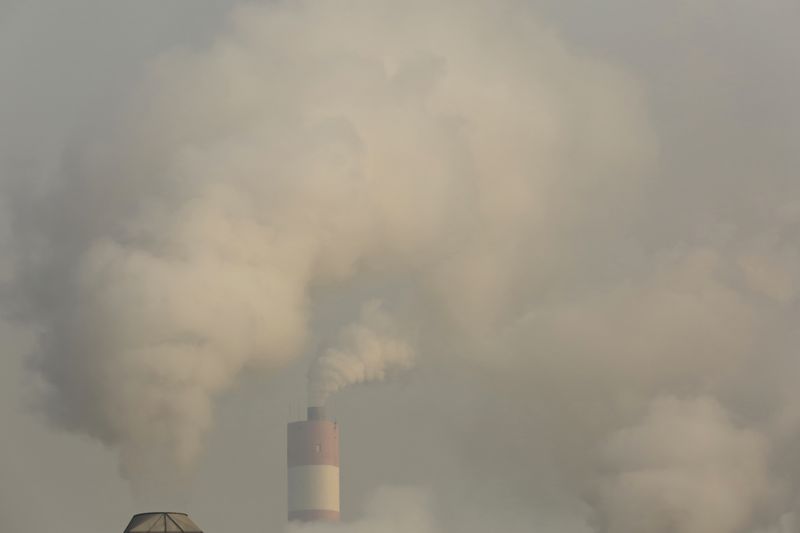By Clyde and Russell
LAUNCESTON, Australia, Aug 12 (Reuters) - The only thing
that's completely predictable about carbon emissions policies is
that nobody will be satisfied.
The latest case in point is Australia, where the
conservative government of Prime Minister Tony Abbott on Tuesday
announced a target of cutting greenhouse gas emissions by 26-28
percent of 2005 by 2030. ID:nL3N10M1SX
The target will form the basis of Australia's submission to
global climate talks in Paris at the end of the year, and Abbott
hailed the goal as meeting both the requirement of maintaining
strong economic growth and strengthening action to mitigate
climate change.
Environmental groups were quick to dismiss the target as
lagging behind other developed nations, with the Australian
Conservation Foundation calling it "defeatist" and showing "no
faith in the ability of Australians to adapt".
Energy companies and miners were more cautious, in keeping
with their status as businesses with shareholders, but some also
expressed disquiet.
The Minerals Council of Australia called the target an
"ambitious goal" that will "impose strains on the Australian
economy, especially export and import-competing industries."
The Energy Supply Association, which represents generators
and power retailers, called it a "credible starting point" that
called for equally credible policy responses.
The need for a re-think on carbon policies goes to the heart
of the issue, and it's here the real problems lie.
Australians, similar to people in other developed nations,
appear to prefer talking past each other when it comes to
climate change, with all sides sticking to well-worn scripts
with very little impetus toward genuine reform, consensus and
compromise.
However, it's consensus and compromise and a willingness to
work with people you've traditionally viewed as enemies that
present the only credible path to meaningful reform.
<^^^^^^^^^^^^^^^^^^^^^^^^^^^^^^^^^^^^^^^^^^^^^^^^^^^^^^^^^
Graphic on Australia's emissions target:
http://reut.rs/1IVmFAp
^^^^^^^^^^^^^^^^^^^^^^^^^^^^^^^^^^^^^^^^^^^^^^^^^^^^^^^^^>
Australia is one of the largest per capita emitters in the
developed world, given its reliance on coal for about 73 percent
of its electricity generation and the preponderance of
emission-intensive industries such as beef, mining and
liquefaction of natural gas.
The recent history of Australia's climate policies
illustrate the lack of consensus and the generally muddled
nature in which the issue has been tackled.
The Labor-led government of former prime minister Kevin
Rudd, who was elected in a landslide in 2007, tried to introduce
a emissions trading scheme along the lines of similar systems in
Europe.
This failed to attract the support of the then opposition
Liberal Party, and also of the Greens, which felt the proposed
scheme didn't go far enough.
The Greens however settled on a far less ambitious scheme
proposed by former prime minister Julia Gillard, who ousted Rudd
in a Labor party room coup and barely held onto power in the
2010 election.
This carbon tax proved toxic among voters and helped
Abbott's Liberals storm to power in 2013 on the back of a pledge
to axe the tax, which they duly did.
TRUST DEFICIT
The net effect of all these shenanigans over climate policy
is that there is a severe trust deficit on all sides, making
sensible, credible policy-making a challenge, if not an
impossibility.
Even the modest target unveiled by Abbott will require the
closure of several coal-fired stations and significant
investment in renewable energy such as wind and solar.
The cuts to coal generation would have to be far more
dramatic if the target was increased to closer to the 40 to 60
percent reduction from 2000 levels cited by the government's
independent expert body, the Climate Change Authority, as needed
to meet an international agreement to limit global warming to
two degrees Celsius over pre-industrial levels.
While it's entirely possible that Australia could switch
more of its generation away from coal, the question of who pays
is far from resolved.
While Australia has large reserves of natural gas, gas-fired
generation has actually been decreasing and faces challenges
from being more costly than coal and the target of
environmentalists, who object to the extraction of the resource
from coal seams or by hydraulic fracturing.
Wind power offers a solution, but Abbott is against the
turbines calling them "visually awful" and proponents of such
projects are finding it increasingly hard to overcome the issues
of financing and objections from local residents.
Already, Hydro Tasmania, the country's largest renewable
energy producer, has scrapped a A$2 billion ($1.42 billion) wind
project that would have been the largest in the southern
hemisphere, and a similar-sized venture in Queensland state is
under threat of not proceeding.
Solar panels have grown rapidly in popularity, mainly as
response to massive increases in retail electricity prices, and
this trend may be accelerated by the lowering of costs and the
coming availability of improved battery storage, as evidenced by
Telsa's Powerwall.
But an increase in solar panels will have consequences for
mainstream electricity generators, distributors and retailers as
the more people who leave the grid, the higher the cost becomes
for those who remain.
What is lacking in Australia is a process under which viable
policies can be developed, and the problem is that there appears
to be little momentum towards getting one going.
(Editing by Michael Perry)
